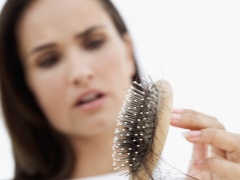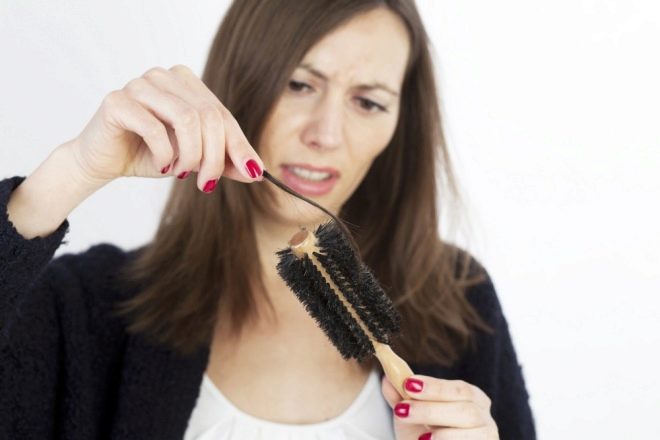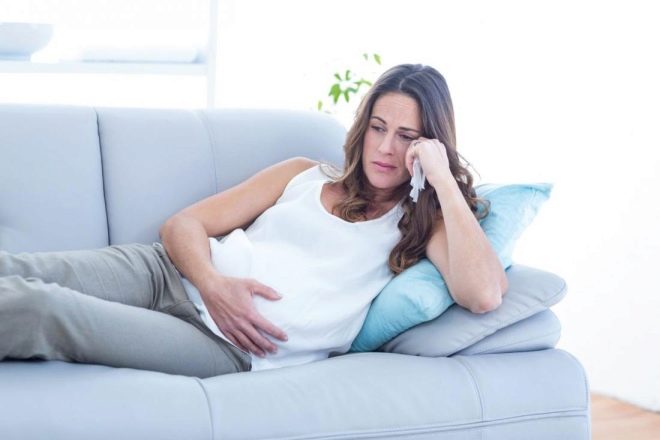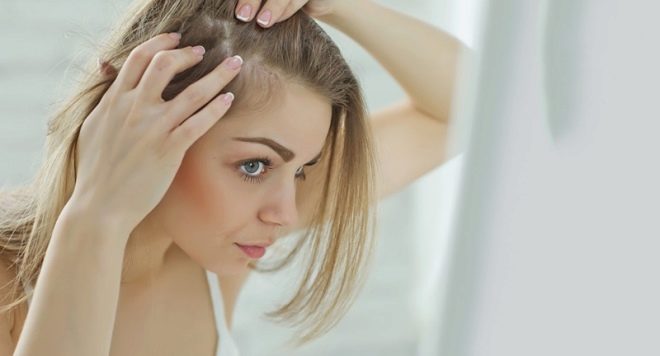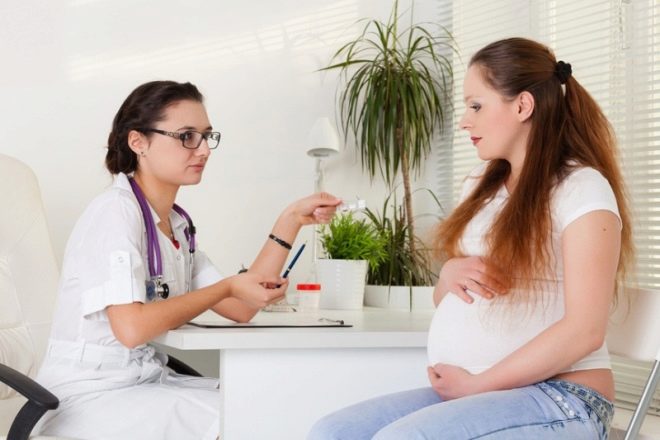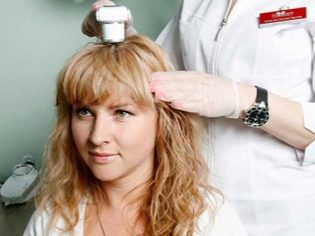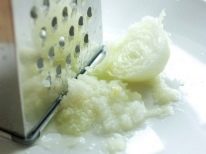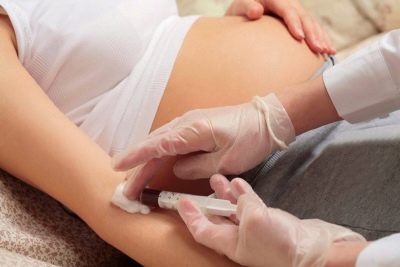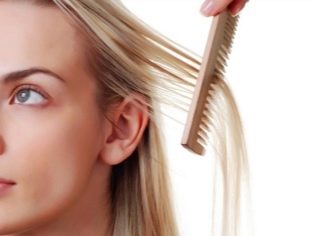Hair fall out during pregnancy: causes and methods of prevention
Hair loss during pregnancy is a fairly common complaint. Very often, this is how a woman's body reacts to hormonal and other alterations associated with carrying a baby. And much depends on how extensive is the amount of damage to the hairline.
The reasons
The condition of the hair can tell a lot to an experienced doctor, because it changes depending on numerous internal factors. Often it is the hair that “signals” about the internal disease first, and it is criminal to not pay attention to hair loss during pregnancy.
During childbirth, the hormone progesterone prevails in the future mother's body, it is he who is responsible for maintaining the pregnancy, for relaxing the walls of the uterus, for the accumulation of nutrients and fluids in the woman's body to nourish the baby. Progesterone usually affects the hair follicles and the hair trunk in a firming way. In most pregnant women, while the child is waiting, the hair becomes stronger, stronger and more beautiful.
And because hair loss should alert the woman and make her see a doctor. There is nothing normal in this state.
Loss is both moderate and significant. It can begin at any time, since the process of hair loss does not depend on the period of carrying a baby directly, it is associated with certain pathological prerequisites.
Slight loss of hair in the early stages, in the first trimester, may be associated with a decrease in immunity, After all, progesterone reduces the immune defense so that the future mother’s body does not discard the embryo. In the second trimester and in the final third, the reason may lie in the lack of certain vitamins, calcium, iron, magnesium. A child in the womb of a mother takes for herself so many nutrients from her blood as he needs for growth and development, a woman’s hair follicles may lack the necessary substances for proper functioning.
Therefore, the main causes of hair loss can be formulated as follows:
- hormonal changes;
- feeling of chronic fatigue;
- strong physical exertion, lack of sleep;
- wrong hair care;
- stresses, worries, fears.
An unbalanced diet, night shifts, excessive use of hairspray, styling mousses, blow-drying, too frequent washing of the head, in which the natural lipid layer of the hair stem is simply washed off, and hair becomes more fragile, can affect the condition of the hair.
In what cases is pathology considered?
Loss of more than 500 hairs per day is a pathological situation. In this case, it is necessary to consult a special doctor - trichologist. It is possible that it will be necessary to have the examination by the therapist, to pass tests. If the hair falls out very much, literally scraps climb, then the lack of vitamins, most likely, is irrelevant.
First of all, the cause of alopecia may be hormonal disorders. To find out, you need to do a blood test for hormonal profile.Also, hair problems can develop in women with diseases of the stomach, pancreas, with certain ailments of the liver and intestines. Hair loss may be the result of infection of the body with worms.
Pregnant women are more prone to allergic reactions - this is a consequence of reduced immunity. The process of alopecia can also be triggered by an allergy factor. In this case, it is impossible to do without an immunogram and consultation of an allergist.
If a woman does too tight hair - tails, tight braids, bunches, then the hair can be thinned mechanically. Also, hair loss can be triggered by a viral illness, for example, flu or ARVI.
In each of these cases, the treatment will have its own characteristics, which is why it is so important to establish the root cause of alopecia in pregnant women.
Means and methods of treatment
In case of pathological hair loss, the doctor should prescribe the treatment, since without removing the underlying cause, the process of losing hair will not stop. With minor hair loss, you can do with folk remedies and vitamins, the use of which the woman must necessarily discuss with her obstetrician-gynecologist. For example, in the first trimester, multivitamins are not shown, because an overdose of some of them may cause abnormal development of the fetus.
It is also not necessary to wait for a quick effect from the treatment, because usually hair loss therapy is long lasting.
A woman may be recommended a course of physiotherapy. Large bald areas are irradiated with UV rays, first applying special photosensitizing compounds to the skin. If there is concomitant anemia (which happens very often), it is recommended to take iron supplements.
If hair falls out due to stress and feelings, the woman will be advised to visit a psychologist who conducts a consultation at the antenatal clinic for free.
Among the folk remedies for hair loss a woman in an "interesting position" fit masks on the skin of onion gruel (raw onions are crushed on a grater and applied on the head for 20-30 minutes, and then washed off), have proven themselves a mixture of onions and garlic, as well as garlic, red pepper and olive oil. These procedures due to local irritation of the scalp will increase the blood circulation of the hair follicles.
Can be used for hair castor and burdock oil. You should not make a mixture of them, it is better to use separately or alternatively. No shampooing decoction of burdock root, as well as egg yolks.
There are lines of medical shampoos and balms against hair loss, they are sold in pharmacies.
Be sure to inform the pharmacist about your “interesting situation”, in which case he will prompt you with a means for washing and caring for your hair on a natural basis.
How to choose vitamins?
There are many vitamin preparations for pregnant women. They are created in such a way that in one capsule the set of substances most necessary for the future mother and her child is combined.
Do not forget that we also receive vitamins from food, and therefore self-administration of vitamins can cause hypervitaminosis. This phenomenon is very dangerous in the early stages, so taking a multivitamin to a healthy pregnant woman is usually shown only from the second trimester of pregnancy, when the consumption of vitamins and minerals increases by the child, and all his organs and systems are already formed and functioning.
Before making a decision on taking vitamins, the expectant mother should contact an obstetrician-gynecologist and pass a blood chemistry test. It will show which substances really need, and which in the body is enough.This will help to make the right choice - a woman can take not multivitamin preparations, but a certain vitamin when it is scarce (for example, if there is a shortage of vitamin A, an appropriate oil solution or capsules is prescribed, if calcium is not enough, calcium preparations in strict dosages).
For hair, vitamins A, E, B5, B2 and B3 are considered essential. These vitamins can be bought in oil solutions and can be applied topically, making hair masks (in the early stages is unacceptable, since an excess of vitamin A can lead to fetal malformations).
Oil solutions of vitamins are mixed and applied to the entire length of the hair, gently rubbing into the scalp. Then you can not rinse the mixture. If the hair falls out at an early gestational age, it is possible to fill the shortage of such substances without resorting to oil solutions, but simply adding foods such as chicken liver, buckwheat porridge, chicken eggs, walnuts, cauliflower, fresh greens to the diet. Calcium can be obtained from milk, cottage cheese, nuts and some varieties of sea fish.
Among the multivitamins that have worked well among pregnant women, it can be noted “Elevit Pronatal”, “Vitrum Prenatal”, “Mother Complivit” and others.
But self-prescribing a vitamin preparation is dangerous, do not forget about it, even if there are only positive reviews about it on the Internet.
Care Tips
Pregnancy - a period when the hair needs special care, which will help prevent hair loss and damage. You should not dye your hair, do a perm during this period. If there is a need for coloring, it is better to use natural products, such as henna or basma. Funds with ammonia and formaldehyde are very dangerous for the unborn child, especially in the early stages, and therefore it is better to refuse permanent staining.
The principles of proper hair care during pregnancy are based on a gentle effect.
- Use natural hair drying, do not dry them after washing with a hair dryer, any thermal effect during this period amid hormonal changes may result in hair loss.
- Do not use curling irons, curling tongs. If there is a need to make curls, use the good old hair curlers, do not first apply to the hair means for fixing.
- Never comb your wet hair, let it dry naturally, and only then take hold of the comb.
- Do not use styling products, varnishes.
- Use only a wooden comb, avoid metal scallops and massage varieties. It is better if your comb has relatively rare teeth. Comb your hair longer than before pregnancy, this simple procedure will help stimulate the blood supply to the hair follicles.
- Do not wash your hair daily - it violates the condition of the hair and scalp. As a result, hair loss and excessive greasiness are also possible due to the intensive work of the sebaceous glands. It is optimal to wash your hair 1-2 times a week.
- Responsibly approach the choice of shampoo. Buy a product that does not contain sulfates in its composition.
- Do not make tight tails, bunches, braids, do not tighten hair with barrettes and rubber bands. If the hair gets in the way, it’s better to do haircutin which there will be no need to tie the hair in the tail.
To maintain healthy hair during pregnancy, need to keep a good moodBecause the stress hormones that are produced when a woman is nervous, have a negative effect not only on the condition of the skin and hair, but also on the level of sex hormones, which increases the likelihood of miscarriage, premature birth.
It is important to walk more, eat a balanced diet, saturate your diet with vegetables and fruits, meat, greens, dairy products. If you have problems with the stomach, intestines, digestion, it is important to consult a doctor, not to self-medicate.
Important: during pregnancy, hormones change, which often causes temporary changes in hair type (they were dry - they became fat, etc.). Reconsider the tools you use for care, you may need completely different ones. This will help to avoid many problems with hair during pregnancy.
More information about hair loss during pregnancy tells a specialist in the video below.
